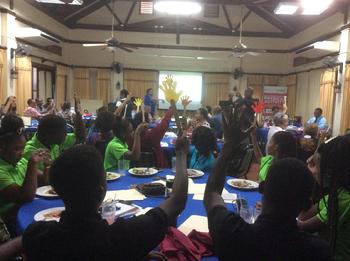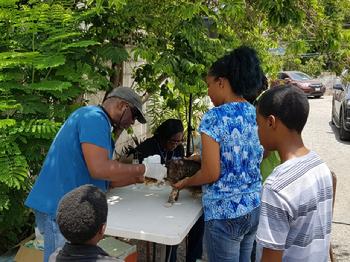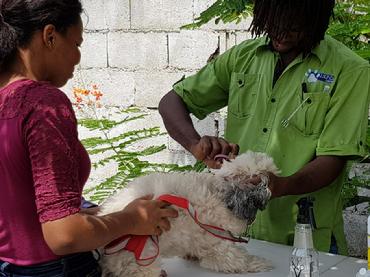 |
| Dr. Gillian Ellis (top left), Dr. Paul Cadogan (top right), Dr. Susan Koenig (bottom left) and Dr. Linnette Peters (bottom right) present at the MAJ Annual Symposium 2019. |
|
| VETS PARTICIPATE IN HUMAN MEDICAL CONFERENCES
June 13, 2019
One Health interactions between the human and veterinary medical communities continue to grow with veterinary participation in two recent human medical conferences.
On May 19, the Caribbean College of Family Physicians Jamaica Chapter (CCFP-J) held the 2019 World Family Doctor Day Conference at the Alhambra Inn. The theme was “Family Doctors in Action: Ageing & Health Challenges in Older Adults” with the keynote presentation by Dr Denise Eldemire-Shearer on “Geriatric giants: Global trends and local applications”.
Amid presentations of case studies with actual patients present, chronic diseases, nutrition, dental care and dermatology, Dr. Paul Cadogan delivered the veterinary contribution entitled “Best Friends: How pets help seniors cope with life’s challenges”.
The Medical Association of Jamaica’s Annual Symposium for 2019, held at the Jamaica Pegasus Hotel from June 6 – 9, had a decidedly One Health theme, “Environment & Health: A Clear & Present Danger” with its kenote Opening Ceremony address being given by Diana McCauley-Hanley, former CEO of the Jamaica Environment Trust.
On Saturday June 8, an entire session was devoted to veterinary presentations. Dr. Paul Cadogan presented on “One Health: from History to the Future”, Dr. Gillian Ellis spoke on “A Bite out of Rabies”, Honorary JVMA member Dr. Susan Koenig, Wildlife Ecologist, presented on Ebola: Understanding Natural Ecosystems to halt repeated spillover” and Dr. Linnette Peters covered “Meat Processing & Prion Diseases”.
Overall the veterinary presentations were well received, with much discussion during question & answer and in the aftermath. It is envisaged that collaboration will continue to grow.
|
 |
| Vet-session speakers engaged in conversation with MAJ symposium attendees following the end of the day's proceedings. |
|
|
| ONE HEALTH DAY CONFERENCE - November 4, 2018 |
 |
| Waving for One Health - in a light-hearted moment of the One Health Day Conference. |
|
November 4, 2018
History was made in the development of One Health in Jamaica on November 4, 2018 when the Caribbean College of Family Physicians Jamaica Chapter and the Jamaica Veterinary Medical Association held a joint 1-day conference in observance of One Health Day 2018. It marked the first time in Jamaica that human and veterinary medical organizations came together to explore some of the linkages and parallels between human and animal health as part of the all-encompassing One Health arena.
International One Health Day is celebrated every year on November 3, having been initiated in 2016. Its goal is to build the cultural will necessary for a sea change in how planetary health challenges are assessed and addressed. It puts the spotlight on the need for One Health interactions and allows the world to see them in action. Related events are not necessarily held on the day itself.
While One Health has been long advocated and supported by the veterinary profession, it is still a relatively new concept to many human health professionals. The CCFP has embraced One Health and is committed to contributing to its growth in Jamaica and the region.
This conference explored wellness, zoonotic diseases, the management of dog bites and screwworm myiasis, along with the issue of the keeping of dogs, their behaviour and population control.
Topics included:
- An overview of One Health history (Dr. Paul Cadogan, veterinarian)
- Wellness for Heath Professionals (Dr. Aldyth Buckland, physician and CCFP-Ja President)
- Rabies in the Caribbean (Dr. Janine Seetahal, veterinarian, via internet from Trinidad)
- Rabies surveillance and Jamaican bats (Dr. Susan Koenig, wildlife ecologist)
- Influenza across the Species (Prof. Chris Oura, veterinary virologist, via internet from Trinidad)
- Leptospirosis, a One Health Approach (Dr. Rayon Gregory, veterinarian)
- The Management of Dog Bites in Humans (Dr. Guyan Arscott, plastic surgeon)
- Screwworm infestations in animals and humans (Dr. Paul Cadogan)
- Dogs: Dangerous Breeds or Responsible Ownership (Dr. Matthew Brown, veterinarian)
The conference was held at the Alhambra Inn in Kingston under the kind sponsorship of Hazpro Medical Waste Management, Cari-Med/Purina, World Brands/Pedigree, and Hi-Pro Farm Supplies with exhibits mounted by the Veterinary Services Division and the Ministry of Health.
The conference room was filled to capacity with over 100 physicians, veterinarians, allied health professionals, paraprofessionals and students. Robust discussions followed each presentation and both associations are keen to repeat and build on the success in 2019.
|
| One Health outreach at community Health Fair |
 |
| JVMA President Dr. Nigel Elliott examines a cat at the Kencot Community Health Fair |
|
| Kingston: July 14, 2018
Multiple arms of health care were brought together in the Kencot community in Kingston in the St. Clements Mission Health Fair, held on July 14, 2018. Residents could access medical and dental care for themselves as well as veterinary care for their pets in a truly One Health event.
Several individuals and organizations contributed to the day. The Health Fair team members included:
- Dr. Dania Jones, Dental Surgeon
- Dr. John Soas, General Practitioner
- Dr. Andrew Josephs, General Practitioner
- Dr. Nigel Elliott, Veterinarian, President, Jamaica Veterinary Medical Association
- Mrs. Hillary Nunes, Dental Nurse
- Mrs. Sandra Anderson-Roberts, Dental Assistant
- Mrs. Kemisha Bernard, Practical Nurse, Diabetes Association of Jamaica
- Mr. Edwards, CPR Demonstrator, St. Johns Ambulance
- Ms. Ricketts, Volunteer, St. Johns Ambulance
- Ms. Duncan, Volunteer, St. Johns Ambulance
- Ms. Gibbs, Volunteer, Women’s Centre of Jamaica
- Cari-Med Mobile Dental Unit
- JSPCA Pet Clinic
- Lions Club Eye Clinic
It is hoped that we will see more such events under the One Health umbrella.
Photos contributed by Dr. Nigel Elliott.
|
 |
| A JSPCA clinic assistant trims fur from the eyes of a Shih Tzu. Matted fur moistened by normal fluids from the eyes frequently can cause maggot infestations around the eyes in this breed. |
|
|
| ZIKA VIRUS - Not a threat to Domestic Animals |
The Ministry of Health has been warning of the introduction of a new vector-borne disease - the Zika Virus, also called ZikV. It has made its first appearence in the western hemisphere, with cases being diagnosed in humans in Brazil.
Zika, caused by a Flavivirus - the same family that includes Dengue Fever and West Nile viruses - is classified as an Emerging Disease and is another that had its origins in animals - specifically non-human primates. It is transmitted by Aedes sp. mosquitoes and thus has the potential to spread wherever these insects exist.
It is NOT known to infect any of the domestic animal species so pets, livestock, horses and other animals around us should remain unaffected should the disease arrive on our shores.
For an article on ZikV, please click HERE.
|
NEW!
CARIBBEAN WATCH
Caribbean One Health Newsletter
Click the issue below
| |
University of Florida ONE HEALTH Newsletter: CLICK HERE (Vol. 8: Issue 3)
|
| World Antibiotic Awareness Week - November 14 - 20, 2015 |
| The vast majority of antibiotics are prescription only items, to be dispensed and used according to the instructions of a licensed physician or dentist for humans, or veterinarian for animals. These medical practitioners must all endeavour to prescribe these drugs responsibly and appropriately. Their patients, be they human or animal need to take the course of treatment as prescribed – no more, no less – unless otherwise instructed by their doctor. Regulatory agencies need to ensure that proper checks and balances are in place regarding the distribution of these drugs.
In the veterinary sector, antibiotic use is essential in the treatment of infections in animals, whether companion or food-producing. Drugs for food producing animals carry a withdrawal period – which is the length of time after the last treatment with the drug in which the food generated from that animal, whether meat or milk becomes safe for human consumption, that is, the animal’s system becomes clear of residues of the drug. To ensure safety, both meat and milk can and are tested for antibiotic residues.
In Jamaica, although the variety of veterinary-specific antibiotics available is very small when compared to our human counterparts, the JVMA strongly advocates for the responsible use of these drugs by our members and the animal-owning public. We must all play our role in protecting this vital part of our health care arsenal. We call on all regulators, prescribers and users of antibiotics to use this week to educate themselves on the issue, and put what they learn into practice. Antibiotics: Handle With Care!
Please click HERE for a release from the World Veterinary Association.
Please click HERE for a Fact Sheet from the World Organization for Animal Health (OIE)
|
The Jamaica Veterinary Medical Association (JVMA) joins in the global observation of Antibiotic Awareness Week. Antibiotics and antimicrobial drug resistance is a major One Health issue facing the broad heath sector.
The development of antibiotics was one of the seminal achievements in medicine in the 20th century. Since the discovery of penicillin by Sir Alexander Fleming in 1928 and its first use to treat infections in 1942, a wide spectrum of classes of antimicrobial drugs have been developed, enabling health professionals to effectively treat bacterial infections that would otherwise have had serious or deadly consequences for the people and animals they affected.
But, unfortunately, bacteria have the capability through genetic diversity and mutation, to develop resistance to these drugs, and the more they have been used, the more resistant strains of these organisms have been emerging. Consequently, we are once again facing a possible future in which these infections will once again be able to take both human and animal lives with impunity. That is…unless action is taken by ALL involved in using antibiotics.
|
|